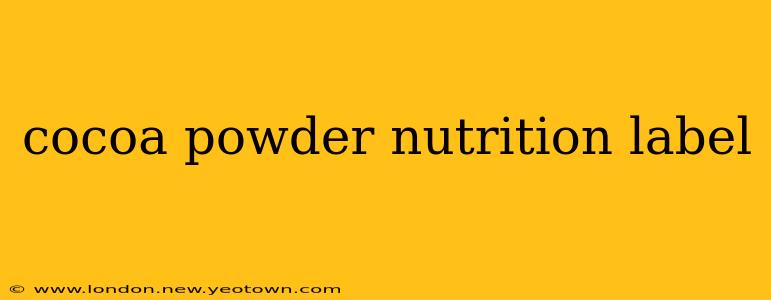Decoding the Cocoa Powder Nutrition Label: A Delicious Dive into Chocolate's Healthy Side
Cocoa powder, that rich, dark dust that transforms simple cakes into decadent delights, holds more than just flavor. It's a nutritional powerhouse, packed with antioxidants and beneficial compounds. But navigating the nutrition label can feel like deciphering an ancient scroll. Let's unravel the mysteries together, exploring what those numbers truly mean and how you can choose the cocoa powder that best fits your health goals.
My journey into the world of cocoa powder began with a simple question: what exactly am I adding to my recipes? I found myself staring blankly at countless nutrition labels, a jumble of calories, fats, and percentages. It was overwhelming, but the more I dug, the more fascinated I became with the nutritional complexity of this humble ingredient.
What are the key nutrients in cocoa powder?
This is where the real story unfolds. Cocoa powder isn't just about calories and fat; it's a rich source of several vital nutrients. The exact amounts vary based on the processing (alkalized vs. natural) and the type of cocoa bean used. However, generally speaking, you can expect to find:
-
High in Antioxidants: Cocoa powder is brimming with flavanols, a type of antioxidant that combats free radicals in the body. These free radicals contribute to cell damage and aging. The higher the flavanol content, the greater the antioxidant benefits. Natural cocoa powder usually boasts a higher concentration than Dutch-processed (alkalized) varieties.
-
Good Source of Minerals: Cocoa powder contains significant amounts of minerals like iron, magnesium, and manganese, all essential for various bodily functions. Iron is vital for oxygen transport, magnesium plays a role in muscle function and blood sugar control, and manganese is a crucial component of various enzymes.
-
Fiber: Cocoa powder offers a modest amount of dietary fiber, contributing to digestive health and helping you feel fuller for longer.
-
Protein: While not a primary protein source, cocoa powder contains a small amount of protein, adding to its overall nutritional value.
What is the difference between natural and Dutch-processed cocoa powder?
This is a question that frequently pops up, and it's a crucial one. The processing method significantly impacts the flavor and nutritional profile:
-
Natural Cocoa Powder: This retains more of the flavanols, those precious antioxidants. It has a slightly more bitter and acidic taste.
-
Dutch-Processed (Alkalized) Cocoa Powder: This undergoes a process that neutralizes the acidity, resulting in a smoother, less bitter flavor. However, this process can reduce the flavanol content, impacting the antioxidant benefits.
Does cocoa powder have a lot of sugar?
The sugar content in cocoa powder itself is typically quite low, especially in unsweetened varieties. However, many commercially available cocoa powders might contain added sugar. Always check the nutrition label carefully and opt for unsweetened options to control your sugar intake.
Is cocoa powder good for weight loss?
While cocoa powder itself isn't a magic weight-loss bullet, its fiber content can contribute to satiety, potentially aiding weight management. However, remember that the addition of sugar, fat, and other ingredients in recipes using cocoa powder will significantly impact its overall caloric and nutritional value.
How much cocoa powder should I consume daily?
There's no strict daily recommended amount of cocoa powder, as it depends on individual health needs and overall diet. Moderation is key. Starting with small amounts and gradually increasing your intake allows your body to adjust and helps avoid potential digestive issues.
My journey through understanding cocoa powder's nutrition label has been enlightening. It’s not just about the calories; it's about the wealth of nutrients hidden within those dark brown granules. By understanding the differences between natural and Dutch-processed varieties and paying close attention to the nutrition facts, you can savor the deliciousness of cocoa while maximizing its health benefits. Remember, always read the label carefully and choose the cocoa powder that aligns best with your dietary goals and preferences.

